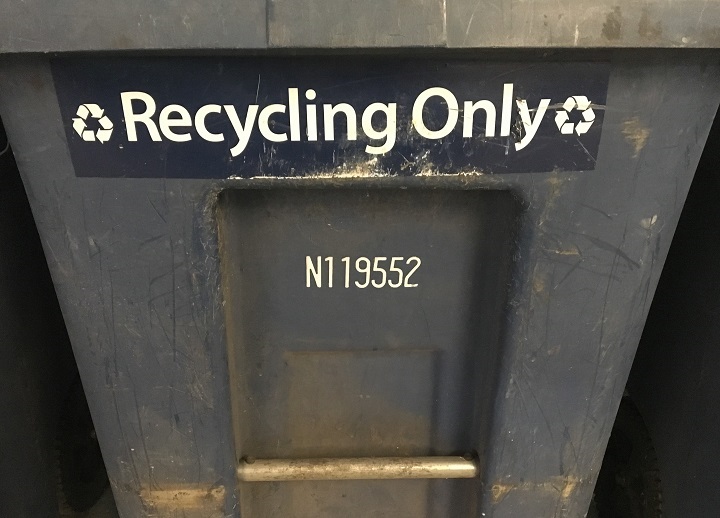Random checks of what’s being put inside recycling carts will soon be taking place, the Regional District of the Central Okanagan announced this week.

The regional district said it will be sending out “recycling ambassadors” from its summer student program to ensure residents are placing the right things in those blue-topped recycling carts. The random checks, the regional district added, are part of an ongoing cart education and inspection campaign to combat recycling contamination.
“We understand that sorting waste and recycling can sometimes be confusing,” said solid waste manager Jodie Foster.
“Most residents are doing a pretty good job including only what’s acceptable to put in the carts. But recycling audits show there are still a significant number of unacceptable items going into our recycling stream, and that’s a big problem.”
WATCH BELOW (Aired April 30, 2019): Clean up your recycling: What to toss in your blue bin

Foster said staff will have a quick look at the contents in recycling carts. If they find items that don’t belong, they’ll leave information explaining what is and isn’t allowed. Foster noted that if there is significant contamination, the cart won’t be picked up until the offending material is removed.

Get breaking National news
WATCH BELOW (Aired May 13, 2019): Recycling right, in Calgary

“Things like plastic bags, garbage, books, food waste, garden hoses, plastic shovels, hazardous waste, electronics, scrap metals, textiles, even yard waste—items that have never been accepted in our curbside recycling program are still showing up and contaminating the recycling stream,” said Foster.
“If we don’t significantly reduce and eliminate these unacceptable products from our recycling loads, we face financial penalties from Recycle BC. We’re close to eight per cent contamination on average and it needs to be three per cent or less. We need to do a better job and that requires continuous education and monitoring.”
According to the regional district, here are some items staff will be looking for:
Garbage
- Garden hoses, landscape edging and tarps
- Paper towels and tissues
- Non-packaging plastics such as toys, Tupperware type containers, laundry baskets
Items recyclable at depots and other locations (but not in the cart)
- Plastic bags, including bagged recyclables
- Styrofoam
- Glass
- Soft plastics, such as cling wrap, bubble wrap, chip and snack bags, zipper bags
- Electronics and small appliances
- Textiles, such as clothes, fabric and pillows
- Soft cover novels and hard cover books and textbooks
Hazardous waste
- Hazards, such as syringes and propane tanks
The regional district said it inspected more than 7,800 recycling carts last year, and that it sent an average of 2,500 letters each year to residents when the wrong materials are found in the recycling, garbage and yard waste carts.
For more about what to recycle in your curbside cart or at a depot, click here.



Comments
Want to discuss? Please read our Commenting Policy first.